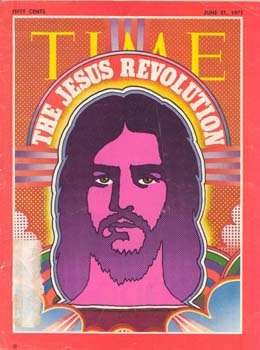Anti-Christian Christian movements?
 The Economist, which I don't often look to for its religion reporting, has an article this week that is rich on scene-setting descriptions and bland on substantive reporting. The focus of the article was a festival in the forest of "alternative" Christians. Not hipsters, so much as people somewhat on the fringes. Here's a snippet :
The Economist, which I don't often look to for its religion reporting, has an article this week that is rich on scene-setting descriptions and bland on substantive reporting. The focus of the article was a festival in the forest of "alternative" Christians. Not hipsters, so much as people somewhat on the fringes. Here's a snippet :
Visitors could learn from Tom Prasada-Rao, a singer, how to chant “Om” and “Hallelujah Hare Krishna”, or hear Paul Fromberg, a pastor from San Francisco, talking about his 2005 wedding to another man. “God is changing the church through the bodies of gay men,” Mr Fromberg told a packed session on human sexuality. Also under discussion was “religious multiple belonging”—in other words, belonging to a clutch of different faiths at once.
Several disillusioned evangelical leaders attended. One was Jay Bakker, son of Jim and Tammy Bakker of the defunct-Praise-the-Lord-TV-network fame, who gave meandering talks on growing up fundamentalist. Frank Schaeffer, who has made a career out of criticising his evangelical parents Francis and Edith Schaeffer, called the Bible “Bronze-Age mythology” and confessed he had a “conflicted ambivalence” about abortion.
OK, I'm a sucker for colorful details. And this article has that in spades.
But it also leaves unanswered some big questions. Starting with: Who are ... these people?
Some are described as liberal Christians, but what do they actually believe? This could be a really, really fascinating article about some new-fangled movement in Christianity. All that we are really told, though, is that this hippie festival Wild Goose Festival targeted "artists and musicians, nonconformists, post-Christians, non-Christians, disaffected evangelicals and a liberal evangelical subset known as the 'emergent' church." Nothing there represents a new movement.
Regardless, where does the belief of guys like Schaeffer come from? When the festival director says "We’re a laboratory for justice, spirituality and art in the way of Jesus," what is he basing that on?
As far as I could tell from reading this article, this festival is more about celebrating the Bible as philosophy and mythology than as a compass for life. Simply saying that evangelicals disapprove of this festival and the theology of its congregants doesn't really cut it:
Most evangelicals do not view the emergents so kindly. The few conservatives at the festival privately complained that the panels were stacked with liberals and that issues dear to them, such as abortion, were neglected. Greenbelt has often met similar criticism in recent years.
Again: Why? Better yet: Show me the conflict, don't tell me that it's there.